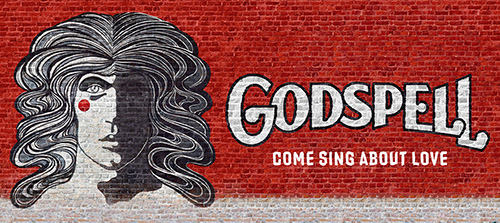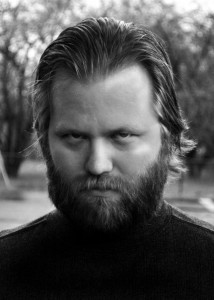To see thee more clearly, to love thee more dearly, to follow thee more nearly, day by day. These three things I pray, and Director Stephen Deininger will enlighten the readers of TheatreBloom just how these three things can be found in his current production of Godspell at Silhouette Stages. With chaos erupting in the streets of Baltimore just a few weeks ago there seems no more poignant of a time to be staging such a relevant musical. Get ready to take the insider’s exclusive journey through this moving and iconic musical in this tell-all interview with its director.
If you could give us a quick introduction of who you are and some of your area local credits, we’ll get started.
Stephen Deininger: I’m Steve Deininger, I’m directing Godspell at Silhouette Stages here at Slayton House of Columbia. Over the past year? Oh my goodness, what have I done in the past year? Well I was on stage in Rumors over at Heritage Players. Oh my goodness, I’m blanking on everything I’ve done. What year is this? I think I’m just exhausted. I know I directed Picasso at the Lapine Agile and played a character in that at Laurel Mill Playhouse, that was last February, and I played Burrs in Andrew Lippa’s The Wild Party, same theatre. I’m starting to remember now. Over the summer I directed All in the Timing with Heritage. And I directed Urinetown there too.
What was the appeal to what to do Godspell as a Director?
Stephen: Okay, so the script has actually been stuck in my head since I played Jesus 15 years ago. Way back in 1999 in Pennsylvania and I did it again in 2006 or 2007. So somehow I still have the script in my head, which is incredibly convenient if you’re directing a show, because it means I can torture the actors with it. I’ve always had a story arc for Godspell in my head that made me say “Yeah, I should probably step back and direct it for once.” Because usually when I get to performing it, my ego gets tied up in there and it blocks what I’m actually trying to do. I always worry “am I a good enough actor, am I a good enough singer, waah waah,” but with directing I focus on the big picture and my ego gets in the way less. So I guess I’ll just tell you about it.
Please, tell us what your concept is behind your vision/version of Godspell.
Stephen: Basically I’m dealing with the most badass character possible, which maybe I guess is a blasphemous or profane thing to say about Jesus, but I mean it as a compliment. We have taken an original view of the script, I mean we’re not electrocuting him on a fence, I’m not Olney.
I don’t have to print that.
You can print that, that’s fine. What I like to do is to break the script down to the base character because Godspell has a lot of tradition that goes with it; you can’t ignore tradition but you have to dig through it to get to the essential elements. You have a character that is famous for saying a lot of things. Take for example, he says “If someone slaps you on the right cheek, you turn and offer him your left.” So people can take that to be this meek little sheep who says if someone smacks you that you ask for it again and again. But when you really dig back into what these things meant in his culture, you see that that isn’t the case at all.
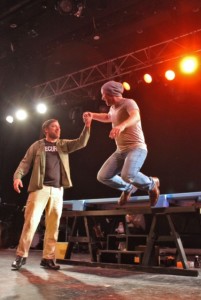
Back when he said that, culturally, you would only do dirty things with your left hand. You deal with animals with your left hand, but you wouldn’t ever use it to strike a servant. And if you’re dealing with a subservient, you backhand them, using your open palm to hit someone is like a challenge to a duel and is reserved for your equal. So if you smack somebody across the right cheek with your right hand, you backhand. If they then offer you their left cheek it’s actually a really badass move because you’re basically saying to them, “I know you’re not going to hit me with your left hand and I know you’re not going to slap me with your palm because that would make us equals. So now what?” Without striking back, without escalating the situation you have disobeyed and left them with no choice. When you really dig into what the character is saying it’s not about not fighting your enemies, but rather disobeying them with love.
When you take that notion and look at the script of Godspell, which I could pick apart for seven and a half hours, which I won’t do that now because we’re sitting here outside of the theatre approaching midnight and my fiancée is waiting for me in the car, but there are so many intricate levels of that kind of story arc inside of it. Take it to a song like “On the Willows”, which originally comes from this psalm where the Jews were taken away from their homeland as slaves. If you break down the lyrics, what they say is “Hey slaves that we kidnapped? Sing me a beautiful song of your land.” And the slaves tell their slave master “No. I can’t sing you a beautiful song because you ripped me away from my home and now I can’t remember my home.” It’s about speaking back to the people who have crushed you down, but not in an aggressive way. It’s this “turn the other cheek mentality” that’s behind all of this.
It’s basically redesigning Godspell from the ground up. I wanted to take these principles of love, even in dealing with those who hate you, to a very modern feel, a very rock concert feel. The whole idea behind Godspell is that you have these principles that are complex but applicable towards modern day things. The guy playing Jesus, who I work with a lot, Andrew Worthington— and it’s funny the last time I had a play with Jesus in it he played my Jesus. We call this the second part of our Jesus trilogy, we don’t know what part three is yet. But Andrew said to me the other week, “This production is so different, but all you did was take the script and change the theme from ‘long live God’ to ‘we can build a beautiful city.’” So I’m taking all of this background research on theology and I’m trying to apply it into anyone’s life; just a modern person. It’s not trying to say that this is the way to be a Christian; it’s not trying to preach. We’re talking about how to be a good person in the modern day. Of course, as we are working this concept our own city nearby is absolutely blowing up.
I was taking this concept of building a beautiful city and building a better community and we looked at it as what was happening in Baltimore was happening. The cast was trying to figure out exactly where we’re going with this, as fate and the concept seemed to be guiding us in the same direction at the moment.
Other than giving the show a rock concert feel, how are you handling the parables, the interactive-kitchyness that Godspell tends to be recognized for?
Stephen: Oh yeah, that’s definitely still there. We have fun with it. It’s a lot of improv. Basically I said to the actors, and I say this to every actor that works in a comedy of mine, “Don’t be afraid to bomb with a joke.” Because the bad jokes and the good jokes will both come out of the same hole in your head and out of the same thought process. You can’t know what will work if you are afraid to try.”
Is the cast comprised of people with whom you’ve previously worked or are there more new people or a blend of both?
Stephen: I think I have at least two people that are consistent collaborators with me, Andrew (playing Jesus) and then I’m marrying another one (ensemble member Samantha McEwan) in June. Yes, Samantha is in this show. Also, Mary Kramer and I have worked together before. But other than that I think everyone else is new to me. I’ve seen them before, around the area, but a lot of people I had scouted from shows I had seen of them, I’d just never worked with them before. I snapped them up from here and there.
What has been your biggest challenge in taking on this project, especially considering the preconceived notions and expectations that audiences tend to associate with a show as well recognized as Godspell?
Stephen: One of the challenges has been trying to balance saying something different with a show that is performed constantly. While there are preconceived notions, one of them is going to be that it is going to be personal. Every production of Godspell is very, very different. I think that the sum total of the people in it give you that difference. It’s less of an exercise in creation and dictation, of “here’s what’s going on my stage” and more about unlocking the personalities involved and what makes them tick and what makes them talented. You try and find people who are talented in very, very interesting ways and then find a way to kind of set them loose in a comedic setting.
One of the big challenges is Act II because Act II, if you’ve seen the movie then you know they’ve cut it, it’s pretty much chopped right out in the movie. It’s a problem because the show goes from being very, very kitschy in Act I to suddenly and extraordinarily downtrodden and apocalyptic, and then back to kitschy and then even more downtrodden. So Act II is very difficult. Act I is very much like a clown show, Act II is almost Shakespeare so that’s a very difficult challenge.
I think another big challenge has been that while there’s a lot going on in the world right now, we’ve found with the concept that was steering the show that we might be making a statement. For anyone who saw Centerstage’s production of One Night in Miami, I use that as an example to the cast, but I loved that show until the last ten seconds. To me, it was a show about the conflicts in the African American community, the infighting about the best way forward during the civil rights movement, but in the end they projected images of individuals killed in racially motivated situations, most predominantly Trayvon Martin. They went with something that was very, very relevant topically to what was happening outside of the theatre but it didn’t feel relevant to the theme of the play itself. What I found was that half the audience the night I attended seemed to hate the two-second flash tribute at the end, and half the audience loved it, and I was trying to figure out why. Was it that it was familiar so they were evoking an emotional response?
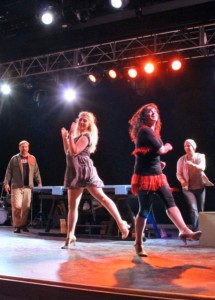
We wanted to take our local lives and our local community— and we’re spread out, I’m up in Baltimore other cast members are down in Columbia— and incorporate that into the show. So when Baltimore was burning it was this big moment of “Oh, crap we’re going in the right direction about building a better city, but now how do we address what’s happening right now?” We actually talked about One Night in Miami, which a few of my cast members had seen, and the choice they made. Their tribute at the end I felt was a bit on the nose; but I had a reaction, even if I didn’t like the choice because it didn’t fit the plot, but that sparked the discussion of how much of modern events should we use and still have it fit the story? We’ve built a window for reality to come into Godspell, but how much reality do we let in? That’s another one of the major problems that has been a giant balancing act in getting this show on its feet.
I think this will make for a very intriguing production, Stephen.
Stephen: All I can say is that we reworked the ending within the bounds of the script. We don’t actually finish the show as written. And I can’t really say any more that. I mean we have a traditional cast of ten, which I think is a good number, and we’re not driving a truck onto the stage or anything, but we definitely have a different ending to Godspell than what people think is coming or may be used to.
What do you think people will be most surprised by, as Godspell does have a following who really follow the show, what do you think will take these Godspell groupies by surprise in your production?
Stephen: I think the artistry. I don’t mean that as a cocky thing, but Godspell is very difficult to actually put on in an artistic fashion, mainly because it gets hurt by bigger budget productions. I think that the feeling of the play is what sells it. Part of the feeling is that it’s cobbled together. You have people that are building something as a community. Now they can be talented; they can be very, very talented. I compare it to this: for an amateur production of Wicked you would have someone run out and tie a rope around Elphaba’s waist, and someone would heave her up when she flies in Defying Gravity. And your audience says “hey, this isn’t really meant for that, we can see the ropes.” Likewise if you’re a production of Godspell where Jesus is flying into the air with a fancy rigging system and get crucified in mid-air and explode and pyrotechnics go off, your audience says “yeah, that’s not exactly what this is about, it distracts from the point.” This show is made on its spit and polish aspect. That’s what sells the play. So I think the surprising thing is how much you can do with so much less.
Is there a moment in the show that speaks to you personally and defines the show for you?
Stephen: Yeah. It’s one that I hate to talk about. Basically the ending came from a very personal place for the entire cast. This was something that we discussed, talked about, and took input from the cast on how do we see it playing out. When the ending started shaping itself a little bit differently than we’d originally intended, the question of how far do we go, how much do we pull back really came into play. It became a group discussion and it became a truly personal expression of the group. The first time, once we decided what we were going to do, they put it into action in rehearsal— it was pretty much one of those things where everyone went home and cried. Godspell is like that. There is that moment at the end where you’re supposed to be depressed— well, there should be— but we’ve taken that moment and built off of it, building another moment that is even more of a tear-jerker, but in a completely different fashion, I think we cried out of hope. It came from a very natural, creative process. I don’t want to go too far into it, I mean we’re not going to get sued or anything like that. Stephen Schwartz gave explicit permission on his website to do what we’re doing, he practically dares productions to try it. But you’ll have to come and see it to see what I’m talking about.
What has taking on this project taught you about yourself as a Director or even just as an individual human being?
Stephen: This is one of those “trust the people around you” kind of things. I’ve been a ringmaster just trying to guide a creative process and a lot of times what I had originally intended has been left on the cutting room floor because of that. But I’m really happy with it. I was playing more with the people and less with the script this time around. I think I’ve learned a little bit about letting go and those sort of things. We’re getting really deep tonight, was that too deep? I mean this is all about struggling to become a better person and even if you fail you’re better for the struggle. God, okay, I have to stop, that was super deep. I’m just so tired. I think I’ve used too many words tonight.
What is it that you are hoping that people will take away from seeing this production of Godspell?
Stephen: I have no idea what they’re going to take away, I’m going to be completely honest there. I want them to go away thinking about it, regardless of what it is they think. But even that is hard to do because to make someone think about a play that has been produced so many times, over and over, it will be tricky. But it’s made me think a lot. I think that’s a good sign. It’s not the sort of play where I’m going home and saying “Okay I’m done with that for now.” I’ve also watched the cast take the things that we’ve been discussing and putting on the stage and apply it to their own lives in small ways, whether they know they are doing it or not.. I’ve watched them support each other, it’s really kind of neat to see that. Normally plays don’t become personal like this, you’re just kind of separated from them, you play a character but it isn’t you. But this one I feel like they have themselves on the stage. I want people to see that.
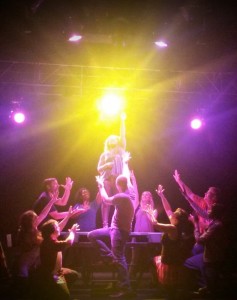
When you see the set there is no suspension of disbelief. There’s an actor playing Jesus. There’s an actor playing John the Baptist and Judas. They play the characters, but on another more important level they are completely themselves. They are putting themselves on stage and they’re playing a character, not “being” a character, and I think the audience is going to be aware of that. You’re going to see lighting equipment and musicians. We’re not hiding the fact that we’re in the theatre performing a piece.
Why should people come and see Godspell at Silhouette Stages?
Stephen: I’ll quote my first drama teacher. I think she was being a little bit hyperbolic with this, but she said “people go to theatre to change their lives.” I don’t believe that that’s true necessarily all of the time, at least not consciously. I don’t think people set out to an evening at the theatre and say “Hey! I’m going to go see this show and it’s going to change my life!” But I think to a larger extent there are people who do go to theater for insight, wishing that it would change the way they see things. We seek art of all kinds to find a new outlook. And this isn’t true of everyone, but I think there are people that if you say something very personally with real conviction, it will make them think about themselves, their community, or their world a little bit differently. I don’t think they’ll be able to put what we’re putting onto stage into practice, it is our fantasy performance world, but I think that just thinking about it in a small way can, if they’re open to it, make themselves better. I know it’s made me a better person just having dug into the script. If you’re open to it, come change your life. This show is saying something personal. If you have someone that opens up their heart to you, it makes you look at things a little bit differently. That’s why I would say come see this production.
Godspell plays through May 24, 2015 at at Silhouette Stages at Slayton House Theatre in Wilde Lake Village Center— 10400 Cross Fox Lane in Columbia, MD. For tickets call the box office at (410) 637-5289, or purchase them online.

